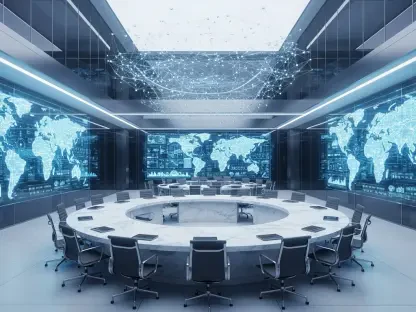In an era where technological innovation drives unprecedented business growth, the tale of Planet Pleasure, a dynamic protein shake manufacturer from Escondido, California, emerges as a chilling cautionary narrative that underscores the perils of digital vulnerability. Founded in 2018 with a modest $2 million seed investment, this company skyrocketed to $100 million in sales by 2023, propelled by its distinctive refrigerated shakes infused with Pacific Rim flavors. The meteoric rise caught the attention of AMG Foods, a heavyweight conglomerate poised to acquire the startup for a staggering $500 million. Yet, hidden beneath the promise of this blockbuster deal were critical weaknesses that neither side fully recognized, setting the stage for a dramatic downfall. The intersection of rapid expansion and digital vulnerability became a harsh lesson in the risks that lurk in high-stakes corporate maneuvers.
The frenzy to seal the acquisition overshadowed vital safeguards. AMG Foods, eager to capitalize on Planet Pleasure’s market appeal, prioritized speed over thorough evaluation, while the startup’s leadership basked in the glow of their success without fortifying their defenses. This oversight proved to be a fatal misstep as a catastrophic event loomed on the horizon, ready to unravel the carefully crafted plans of both entities. What unfolded serves as a stark reminder that in today’s interconnected business landscape, technological threats can strike at the most pivotal moments, turning dreams of expansion into nightmares of loss and recovery.
The Cyber Threat Landscape in M&A
Unseen Risks in High-Stakes Deals
The saga of Planet Pleasure illuminates a pervasive issue in the realm of mergers and acquisitions: the dangerous oversight of cyber risks amid the rush for lucrative deals. When AMG Foods set its sights on the $500 million acquisition, the focus was squarely on the potential for market dominance and revenue growth. However, this tunnel vision obscured the need for a meticulous assessment of the startup’s digital infrastructure. The allure of quick gains often blinds companies to the underlying threats that can jeopardize not just the deal, but the very foundation of the businesses involved. In this case, the failure to prioritize cybersecurity during the negotiation phase allowed vulnerabilities to fester, ultimately leading to a crisis that could have been mitigated with proper foresight and planning.
Beyond the immediate financial implications, the broader lesson here is the necessity of embedding risk evaluation into the core of M&A strategies. High-stakes transactions, while promising immense rewards, carry equally significant dangers if due diligence is treated as an afterthought. The experience of Planet Pleasure and AMG Foods underscores that cyber threats are not mere technical hiccups but strategic business challenges. Companies must adopt a mindset where cybersecurity assessments are as critical as financial audits, ensuring that potential pitfalls are identified and addressed before they spiral into disasters. This approach can mean the difference between a successful integration and a costly debacle.
Insider Threats and Technical Vulnerabilities
At the heart of Planet Pleasure’s downfall was a devastating cyber attack orchestrated by a disgruntled IT employee, a stark illustration of how insider threats can amplify technical weaknesses. Frustrated by the looming acquisition and the specter of layoffs, this individual introduced malware into the company’s systems, targeting the refrigerated production line that defined the brand’s market edge. The attack’s rapid spread to IT and accounting systems revealed a glaring lack of robust digital defenses, exposing how a single act of malice can cripple an entire operation. This incident highlights the dual nature of cyber risks, where internal discontent converges with inadequate safeguards to create a perfect storm of disruption.
Equally concerning is the ease with which such threats can go undetected until it’s too late. The absence of stringent access controls and monitoring mechanisms at Planet Pleasure allowed the malware to propagate unchecked, magnifying the damage. This scenario emphasizes the urgent need for businesses to fortify their technological frameworks while simultaneously fostering a workplace environment that mitigates internal grievances. Addressing employee concerns and building trust are just as vital as implementing firewalls and encryption. Without this balance, companies remain vulnerable to attacks from within, which can be far more insidious than external breaches due to the intimate knowledge insiders possess of system weaknesses.
Lessons in Preparedness and Recovery
The Perils of Untested Plans
One of the most glaring failures in Planet Pleasure’s crisis was the existence of a business continuity plan that was never put to the test. On paper, the company appeared prepared, complete with a cyber insurance policy and a recovery strategy. However, the absence of practical drills or simulations meant that when the malware attack struck, chaos ensued. Response teams were unprepared, coordination faltered, and recovery efforts lagged, resulting in business interruption costs ballooning to $30 million in just three weeks. This stark reality drives home the point that untested plans are little more than decorative documents, offering no real protection when disaster strikes. Businesses must commit to regular, hands-on exercises to ensure their strategies hold up under pressure.
The financial and operational toll of this oversight cannot be overstated. Empty shelves and frustrated customers became the visible scars of Planet Pleasure’s unpreparedness, while behind the scenes, the lack of rehearsed protocols delayed every step of the recovery process. This situation serves as a powerful reminder that preparedness is not a checkbox to be ticked but a dynamic, ongoing effort. Companies must simulate cyber incidents, train staff, and refine their plans based on real-world feedback. Only through such rigorous testing can businesses hope to minimize downtime and protect their bottom line when faced with inevitable digital threats in an increasingly hostile landscape.
Due Diligence Gaps
AMG Foods’ approach to due diligence during the acquisition process revealed critical shortcomings that exacerbated the crisis. While some attention was paid to Planet Pleasure’s cyber defenses, the evaluation remained superficial, failing to probe the startup’s readiness for recovery or the alignment of continuity strategies between the two entities. This gap in scrutiny meant that AMG Foods underestimated the vulnerabilities embedded in the smaller company’s operations. The result was a post-acquisition nightmare, with the conglomerate’s CEO describing the fallout as a “train wreck.” Thorough due diligence must extend beyond surface-level checks to include a deep dive into how well-prepared a target company is to handle crises, ensuring that integration does not amplify existing risks.
Moreover, the oversight in this case points to a broader issue in M&A transactions: the tendency to prioritize financial and legal aspects over operational resilience. AMG Foods’ failure to anticipate the cascading effects of a cyber incident on Planet Pleasure’s unique production process led to significant reputational damage alongside financial losses. This underscores the importance of a holistic assessment that considers not just what a company brings to the table, but how its weaknesses could impact the acquiring entity. Future deals must incorporate rigorous stress-testing of digital and recovery frameworks, treating these elements as non-negotiable components of the due diligence process to prevent similar disasters from unfolding.
Building Resilience for the Future
Reflecting on the wreckage of this fictional yet all-too-realistic scenario, actionable insights emerge for businesses navigating the digital age. Recommendations from risk management experts emphasize the need for comprehensive cyber due diligence that goes beyond checklists to include real-world testing of systems and plans. Regular simulations of cyber attacks can expose weaknesses before they are exploited, while aligning insurance coverage with M&A strategies ensures that financial protections are tailored to specific risks. This proactive stance transforms risk management from a reactive burden into a strategic asset, safeguarding companies against the unpredictable nature of digital threats during transformative periods like acquisitions.
Additionally, resilience demands a cultural shift within organizations to prioritize ongoing commitment over one-time fixes. Businesses must treat cybersecurity and business continuity as integral to their growth, embedding these practices into daily operations rather than viewing them as separate concerns. This means fostering open communication to address employee unrest, which can fuel insider threats, and investing in continuous training to keep defenses up to date. The fallout from Planet Pleasure’s experience serves as a call to action for companies to build robust frameworks that anticipate and withstand cyber challenges. By doing so, they can protect not only their operations but also their reputation and long-term viability in a world where digital risks are ever-present.









